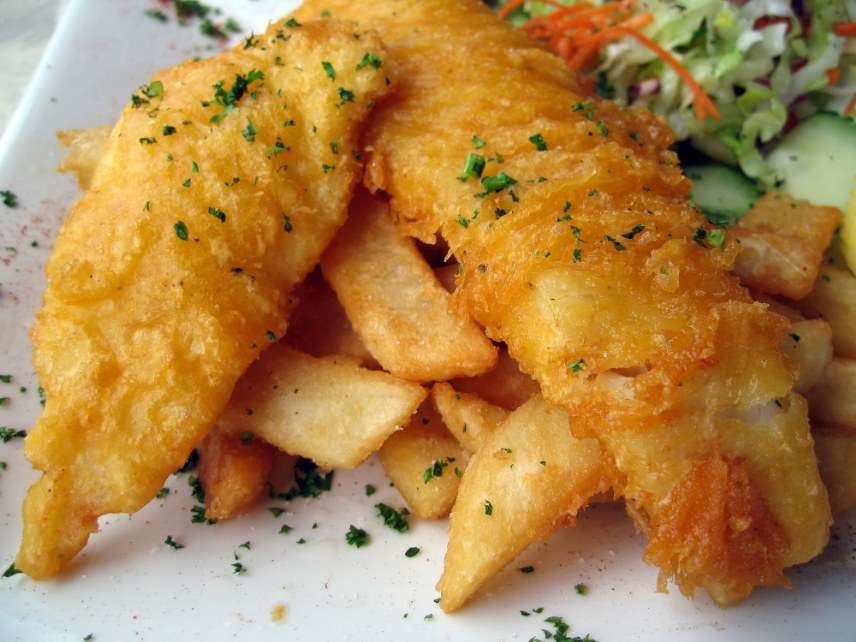Should Lawmakers Care How Much Fish Is in a Sustainable Fish Finger?
Choose education over regulation when food companies abuse terms like "local" and "sustainable."

Earlier this week, while waiting for a flight home, I ate lunch at the O'Hare Airport outpost of The Publican, a fantastic, meat-centric Chicago restaurant. I've eaten at their downtown location several times over the years, sampling from their menu foods such as beef heart tartare, boudin blanc, and skate wing. The foods at the airport location are a little less interesting, though still far better than most airport food.
After paying my bill and running to catch my flight, I noticed a cooler outside the restaurant that featured a variety of beverages. Garden-variety sodas (including orange Fanta), bottled waters, energy drinks, and the like. None would have been out of place at your local 7-Eleven. Then I glanced at the top of the case and was stopped, bemusedly, in my tracks. It featured signage billing the sodas and whatnot within as "Local, Sustainable, Delicious."
Hmm. Orange-flavored Fanta, a friend pointed out, may be "delicious," but it—along with everything else in the case—was neither "local" nor "sustainable" by any reasonable definition of these words.
I halted to snap a photo of the case. Though I almost missed my flight in the process, it was a worthwhile delay. The photo says so much, I think, about the lengths marketers in general, food marketers specifically, and, here, restaurants will go to choose language that tells us what we want to hear in an effort to earn our business.
The next morning, still chuckling about the experience thanks to friends who'd commented on a Facebook post I'd made about the local, sustainable, and delicious canned and bottled drinks, I happened upon a story about this week's season debut of Tricks of the Restaurant Trade, a show from Britain's Channel 4 that uncovers artifices restaurants use to attract customers and maximize profits, and educates customers about how not to get snookered.
The show, which debuted last year, explores "how consumers can get the best experience when dining out."
"Every restaurant uses glowing adjectives and enticing descriptions to encourage their customers to buy more of its food," The Daily Mail reported this week, in a piece on the debut of the show's current season. "But if you see the words 'hand-made,' 'home-cooked,' or 'fresh,' then don't fall for the claims hook, line and sinker as the food may not live up to its label."
If this show were American, I suspect a large part of its focus—like most local television consumer investigations—would be to call for more regulations to rein in the big, evil food companies that deceive us. Thankfully, after watching a few clips from Tricks of the Restaurant Trade, I detected no such bent to the program.
What I did see, though, was some good, basic consumer education.
The idea that food sellers (or anyone selling anything at all) want to make their products appear somehow better than they are is hardly anything new. Neither are investigations into the practice. A Wall St. Journal video from 2014, for example, looked at "sly tricks [restaurants use] to get you to spend more for your meal."
In legal circles, the practice is known as "puffery," which this brilliantly titled article, "The World's Most Trusted Article on Puffery," describes eloquently. Puffery falls short of fraud.
Nevertheless, these practices have faced increased bureaucratic scrutiny in recent years. EU regulators are currently looking to crack down down on food producers that market foods of different qualities in different countries without declaring so by, for example, marketing higher-quality juice or bread in France than in Poland but selling both under the same label.
"I will not accept that in some parts of Europe, people are sold food of lower quality than in other countries, despite the packaging and branding being identical," said Jean-Claude Juncker, president of the European Commission, in a speech last month announcing the new guidelines. "Slovaks do not deserve less fish in their fish fingers," he added.
Neither, I might add, do Slovaks and other Europeans necessarily deserve more regulators' fingers in their fish.
In recent years, there have been some rumblings about bringing the fish-finger approach to the United States. Thankfully, those plans seem to have been held at bay for now.
Tricks of the Restaurant Trade and investigations like it serve as valuable tools for educating consumers and help mitigate the need for costly, burdensome, and intrusive regulations. Cheers to more of the former and less of the latter.
